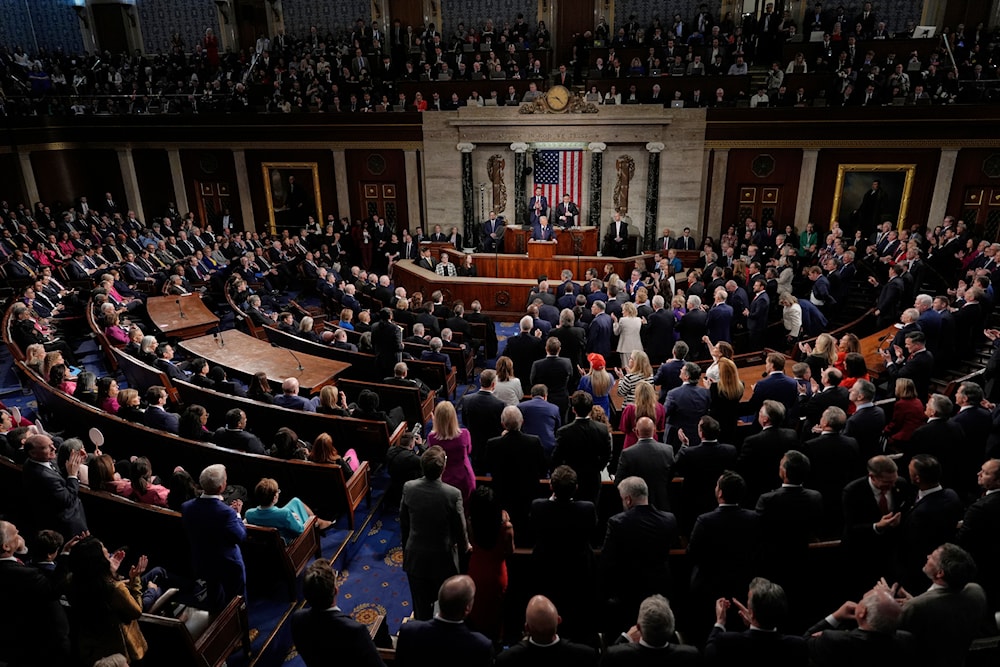Democratic Party's favorability reaches record low: CNN poll
As dissatisfaction grows in the ranks of Democratic and Democratic-leaning independents, only 63% hold a favorable view of their party, an almost 20-point drop since Biden's inauguration.
-

Republicans stand as Democrats sit as President Donald Trump addresses a joint session of Congress in the House chamber at the U.S. Capitol in Washington, on March 4, 2025. (AP)
The Democratic Party's favorability in the United States has dropped to a record low according to the latest CNN poll conducted by SSRS and published on Monday, as dissatisfaction grows among its frustrated supporters.
A slim majority of Democratic-aligned adults, 52% to 48%, believe the party’s leadership is steering it in the wrong direction, a shift from eight years ago when opinions were largely positive. Among the broader public, the Democratic Party’s favorability has dropped to 29%—its lowest level in CNN polling since 1992 and a 20-point decline since January 2021, when Trump left office following the January 6 attack on the Capitol, while the Republican Party’s favorability currently sits at 36%.
Conducted from March 6-9, the survey took place just days before 10 Democratic senators, including Senate Minority Leader Chuck Schumer, sided with Republicans to move forward with a GOP-drafted spending bill aimed at preventing a government shutdown, a decision that frustrated many Democratic lawmakers and drew criticism from progressive voices.
Amid growing calls within the party for stronger opposition to President Donald Trump, Democrats and Democratic-leaning independents favor blocking the Republican agenda over collaborating with the GOP to advance Democratic policies by a margin of 57% to 42%.
The shift toward opposing the GOP reflects a major change in the party’s stance since the beginning of Trump’s first term. A September 2017 poll showed that 74% of Democrats and Democratic-leaning independents favored working with Republicans to push their priorities, while only 23% supported a more confrontational approach.
Fueled in part by growing dissatisfaction within the Democratic Party, only 63% of Democrats and Democratic-leaning independents now hold a favorable view of their party, down from 72% in January and 81% at the start of President Joe Biden’s administration. This decline spans ideological divisions, as favorability ratings for the party have dropped by 18 points among both liberals and moderates since early 2021.
On the other hand, 79% of Republicans and Republican-leaning independents currently view the GOP favorably, while political independents hold unfavorable opinions of both major parties, with only 19% expressing a positive view of the Democrats and 20% saying the same about the Republicans.
Around half of Americans now see the Democratic and Republican parties as too extreme rather than mainstream, a shift from 2022 when 56% viewed Democratic positions as mainstream, while perceptions of the GOP have remained largely unchanged.
Americans still differentiate between Trump and his party, with the president seen as too extreme by nine points more than the GOP overall, though this gap has narrowed from 18 points in 2022.
While most Democrats see Trump's policies and opinions as too extreme, they have yet to rally around a single party leader as a counterpoint, and when asked who best reflects Democratic values, 10% name Rep. Alexandria Ocasio-Cortez, 9% Kamala Harris, 8% Bernie Sanders, 6% Hakeem Jeffries, and 4% each Barack Obama and Rep. Jasmine Crockett, with Chuck Schumer among others at 2%, and more than 30% didn't offer a name, with one survey respondent saying "No one, that's the problem."
Views on the Democratic Party and its leadership vary sharply by demographics, with self-identified Democrats far more likely than Democratic-leaning independents to hold a favorable opinion of the party (72% to 37%) and to believe its leaders are steering it in the right direction (53% to 34%).
The party leadership receives mostly positive ratings from Democratic-aligned women (57%), people of color (57%), and those without college degrees (60%), while support is lower among men (38%) and White college graduates (32%).
Meanwhile, majorities across all demographics want Democrats to focus on blocking the Republican agenda, with little difference between self-identified Democrats and Democratic-leaning independents. Moderates are the only group slightly favoring compromise, supporting cooperation with Republicans by a narrow 51% to 48% margin.

 4 Min Read
4 Min Read








